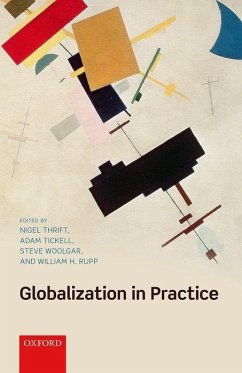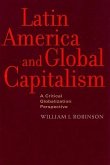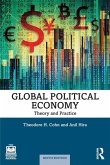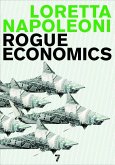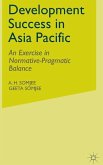- Gebundenes Buch
- Merkliste
- Auf die Merkliste
- Bewerten Bewerten
- Teilen
- Produkt teilen
- Produkterinnerung
- Produkterinnerung
In short, punchy essays by distinguished researchers from across a range of disciplines, this book provides a new way of understanding globalization, moving away from the standard accounts of global forces, economic flows, and capitalist dynamics, to show how ordinary practices and artefacts are crucial elements and symbols of globalization.
Andere Kunden interessierten sich auch für
![Latin America and Global Capitalism Latin America and Global Capitalism]() William I RobinsonLatin America and Global Capitalism63,99 €
William I RobinsonLatin America and Global Capitalism63,99 €![Global Political Economy Global Political Economy]() Theodore H CohnGlobal Political Economy314,99 €
Theodore H CohnGlobal Political Economy314,99 €![Global Political Economy Global Political Economy]() Theodore H CohnGlobal Political Economy278,99 €
Theodore H CohnGlobal Political Economy278,99 €![Global Political Economy Global Political Economy]() Theodore H CohnGlobal Political Economy106,99 €
Theodore H CohnGlobal Political Economy106,99 €![New Frontiers in Feminist Political Economy New Frontiers in Feminist Political Economy]() New Frontiers in Feminist Political Economy184,99 €
New Frontiers in Feminist Political Economy184,99 €![Rogue Economics Rogue Economics]() Loretta NapoleoniRogue Economics19,99 €
Loretta NapoleoniRogue Economics19,99 €![Development Success in Asia Pacific Development Success in Asia Pacific]() A H SomjeeDevelopment Success in Asia Pacific106,99 €
A H SomjeeDevelopment Success in Asia Pacific106,99 €-
-
-
In short, punchy essays by distinguished researchers from across a range of disciplines, this book provides a new way of understanding globalization, moving away from the standard accounts of global forces, economic flows, and capitalist dynamics, to show how ordinary practices and artefacts are crucial elements and symbols of globalization.
Produktdetails
- Produktdetails
- Verlag: Oxford University Press (UK)
- Seitenzahl: 310
- Erscheinungstermin: 19. August 2014
- Englisch
- Abmessung: 234mm x 163mm x 23mm
- Gewicht: 635g
- ISBN-13: 9780199212620
- ISBN-10: 0199212627
- Artikelnr.: 40029907
- Herstellerkennzeichnung
- Libri GmbH
- Europaallee 1
- 36244 Bad Hersfeld
- gpsr@libri.de
- Verlag: Oxford University Press (UK)
- Seitenzahl: 310
- Erscheinungstermin: 19. August 2014
- Englisch
- Abmessung: 234mm x 163mm x 23mm
- Gewicht: 635g
- ISBN-13: 9780199212620
- ISBN-10: 0199212627
- Artikelnr.: 40029907
- Herstellerkennzeichnung
- Libri GmbH
- Europaallee 1
- 36244 Bad Hersfeld
- gpsr@libri.de
Nigel Thrift is Vice-Chancellor of the University of Warwick. He joined Warwick from the University of Oxford where he was made Head of the Division of Life and Environmental Sciences in 2003 before becoming Pro-Vice-Chancellor for Research in 2005. He has been the recipient of a number of distinguished academic awards including the Royal Geographical Society Victoria Medal for contributions to geographic research in 2003, Distinguished Scholarship Honors from the Association of American Geographers in 2007 and the Royal Scottish Geographical Society Gold Medal in 2008. He was made a Fellow of the British Academy in 2003 and received an Honorary LLD from the University of Bristol in 2010. His current research spans a broad range of interests, including international finance; cities and political life; non-representational theory; affective politics; and the history of time. Adam Tickell is Pro Vice-Chancellor (Research and Knowledge Transfer) and Professor of Geography at the University of Birmingham and has worked at the Universities of Leeds, Manchester, Southampton and London. He received his BA and PhD from the University of Manchester. He was editor of Transactions, Institute of British Geographers, has co-edited books on economic geography with Trevor Barnes, Jamie Peck and Eric Sheppard and has authored numerous papers on his areas of interest. Steve Woolgar is Chair of Marketing at the Saïd Business School, University of Oxford, Head of the Science and Technology Studies group at InSIS (Institute for Science, Innovation and Society), and is a Professorial Fellow of Green Templeton College. He has published widely in social studies of science and technology, social problems and social theory, including Laboratory Life: the construction of scientific facts (with B Latour, Princeton), Science: the Very Idea (Routledge), Knowledge and Reflexivity (Sage), The Cognitive Turn: sociological and psychological perspectives on science (with S.Fuller and M.de Mey, Kluwer), Representation in Scientific Practice (with M. Lynch, MIT), The Machine at Work: technology, organisation and work (with K.Grint, Polity), and Virtual Society? Technology, cyberbole, reality (OUP). William H. Rupp received his doctorate from the University of Warwick and holds degrees from the University of Toronto and Wilfrid Laurier University. Currently, he is engaged with Warwick's Widening Participation work and is responsible for a major outreach programme. He also served as assistant editor to The European World 1500-1800 (ed. Beat Kümin; Routledge 2009 with 2nd ed. forthcoming).
* Introduction
* Respecifying Globalization
* Travel, tourism, and mobility
* Airports
* Backpacking
* Walking
* Mobile Phone
* Mobility
* World Maps
* Airport Security
* Passports
* Business Travel
* Sex Workers
* Gap Year
* Infrastructure and transport
* Pipelines
* Pipes and Wires
* Automated Repair and Back-up Systems
* Global Recycling: The Case of Electronic Waste
* Road Safety and Traffic Management
* Containers
* Resisting the Global
* Globalization of a Labour Market: The Case of Seafarers
* Banal Globalization: The Deep Structure of Oil and Gas
* Putting Standards to Work The Taste and Smell of Globalization
* Finance and business
* Flowers
* Bureaux de Change
* LIBOR
* Taking Note of Export Earnings
* Filthy Lucre: Urine for Sale
* Emotion in Finance
* Credit Rating Agencies
* Globalization s Freelancers, Democracy s Decline: Harvard, the
Chubais Clan, and U.S. Aid to Russia
* Stock Trading
* Media, consumption, and leisure
* Cigarette Packages: The Big Red Chevron and the 282 Little Kids
* Collecting and Consumption in the Era of eBay
* Interaction Order of Auctions of Fine Art and Antiques
* Intellectual Property
* Curvature of Global Brand Space
* Bollywood
* Global News (Service) Networks
* How Rounders Goes Around the World
* Health and nature
* Biodiversity and Globalization
* Mobility and the Medical Image
* e-Solutions to Sharing Information in Child Protection: the Rise and
Fall of ContactPoint
* Globalizing of Bananas: Of Rhizomes, Fungi, and Mobility Systems
* Order and control
* Forms that Form
* Accounting for the Calculating Self
* Replaying Society to the World Through CCTV
* AK-47 as a Material Global Artefact
* Human Rights
* Classifications
* Area Based Classifications
* First Names: Examples from Germany
* One of My Top Ten Days
* Barcodes and RDIF
* ISO 9000
* Number
* Respecifying Globalization
* Travel, tourism, and mobility
* Airports
* Backpacking
* Walking
* Mobile Phone
* Mobility
* World Maps
* Airport Security
* Passports
* Business Travel
* Sex Workers
* Gap Year
* Infrastructure and transport
* Pipelines
* Pipes and Wires
* Automated Repair and Back-up Systems
* Global Recycling: The Case of Electronic Waste
* Road Safety and Traffic Management
* Containers
* Resisting the Global
* Globalization of a Labour Market: The Case of Seafarers
* Banal Globalization: The Deep Structure of Oil and Gas
* Putting Standards to Work The Taste and Smell of Globalization
* Finance and business
* Flowers
* Bureaux de Change
* LIBOR
* Taking Note of Export Earnings
* Filthy Lucre: Urine for Sale
* Emotion in Finance
* Credit Rating Agencies
* Globalization s Freelancers, Democracy s Decline: Harvard, the
Chubais Clan, and U.S. Aid to Russia
* Stock Trading
* Media, consumption, and leisure
* Cigarette Packages: The Big Red Chevron and the 282 Little Kids
* Collecting and Consumption in the Era of eBay
* Interaction Order of Auctions of Fine Art and Antiques
* Intellectual Property
* Curvature of Global Brand Space
* Bollywood
* Global News (Service) Networks
* How Rounders Goes Around the World
* Health and nature
* Biodiversity and Globalization
* Mobility and the Medical Image
* e-Solutions to Sharing Information in Child Protection: the Rise and
Fall of ContactPoint
* Globalizing of Bananas: Of Rhizomes, Fungi, and Mobility Systems
* Order and control
* Forms that Form
* Accounting for the Calculating Self
* Replaying Society to the World Through CCTV
* AK-47 as a Material Global Artefact
* Human Rights
* Classifications
* Area Based Classifications
* First Names: Examples from Germany
* One of My Top Ten Days
* Barcodes and RDIF
* ISO 9000
* Number
* Introduction
* Respecifying Globalization
* Travel, tourism, and mobility
* Airports
* Backpacking
* Walking
* Mobile Phone
* Mobility
* World Maps
* Airport Security
* Passports
* Business Travel
* Sex Workers
* Gap Year
* Infrastructure and transport
* Pipelines
* Pipes and Wires
* Automated Repair and Back-up Systems
* Global Recycling: The Case of Electronic Waste
* Road Safety and Traffic Management
* Containers
* Resisting the Global
* Globalization of a Labour Market: The Case of Seafarers
* Banal Globalization: The Deep Structure of Oil and Gas
* Putting Standards to Work The Taste and Smell of Globalization
* Finance and business
* Flowers
* Bureaux de Change
* LIBOR
* Taking Note of Export Earnings
* Filthy Lucre: Urine for Sale
* Emotion in Finance
* Credit Rating Agencies
* Globalization s Freelancers, Democracy s Decline: Harvard, the
Chubais Clan, and U.S. Aid to Russia
* Stock Trading
* Media, consumption, and leisure
* Cigarette Packages: The Big Red Chevron and the 282 Little Kids
* Collecting and Consumption in the Era of eBay
* Interaction Order of Auctions of Fine Art and Antiques
* Intellectual Property
* Curvature of Global Brand Space
* Bollywood
* Global News (Service) Networks
* How Rounders Goes Around the World
* Health and nature
* Biodiversity and Globalization
* Mobility and the Medical Image
* e-Solutions to Sharing Information in Child Protection: the Rise and
Fall of ContactPoint
* Globalizing of Bananas: Of Rhizomes, Fungi, and Mobility Systems
* Order and control
* Forms that Form
* Accounting for the Calculating Self
* Replaying Society to the World Through CCTV
* AK-47 as a Material Global Artefact
* Human Rights
* Classifications
* Area Based Classifications
* First Names: Examples from Germany
* One of My Top Ten Days
* Barcodes and RDIF
* ISO 9000
* Number
* Respecifying Globalization
* Travel, tourism, and mobility
* Airports
* Backpacking
* Walking
* Mobile Phone
* Mobility
* World Maps
* Airport Security
* Passports
* Business Travel
* Sex Workers
* Gap Year
* Infrastructure and transport
* Pipelines
* Pipes and Wires
* Automated Repair and Back-up Systems
* Global Recycling: The Case of Electronic Waste
* Road Safety and Traffic Management
* Containers
* Resisting the Global
* Globalization of a Labour Market: The Case of Seafarers
* Banal Globalization: The Deep Structure of Oil and Gas
* Putting Standards to Work The Taste and Smell of Globalization
* Finance and business
* Flowers
* Bureaux de Change
* LIBOR
* Taking Note of Export Earnings
* Filthy Lucre: Urine for Sale
* Emotion in Finance
* Credit Rating Agencies
* Globalization s Freelancers, Democracy s Decline: Harvard, the
Chubais Clan, and U.S. Aid to Russia
* Stock Trading
* Media, consumption, and leisure
* Cigarette Packages: The Big Red Chevron and the 282 Little Kids
* Collecting and Consumption in the Era of eBay
* Interaction Order of Auctions of Fine Art and Antiques
* Intellectual Property
* Curvature of Global Brand Space
* Bollywood
* Global News (Service) Networks
* How Rounders Goes Around the World
* Health and nature
* Biodiversity and Globalization
* Mobility and the Medical Image
* e-Solutions to Sharing Information in Child Protection: the Rise and
Fall of ContactPoint
* Globalizing of Bananas: Of Rhizomes, Fungi, and Mobility Systems
* Order and control
* Forms that Form
* Accounting for the Calculating Self
* Replaying Society to the World Through CCTV
* AK-47 as a Material Global Artefact
* Human Rights
* Classifications
* Area Based Classifications
* First Names: Examples from Germany
* One of My Top Ten Days
* Barcodes and RDIF
* ISO 9000
* Number

